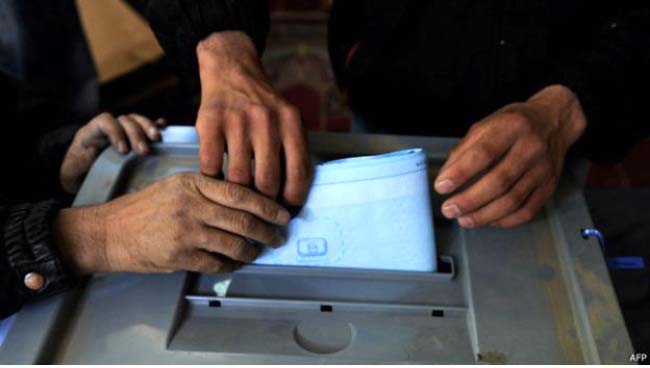Despite the rejection of the two presidential decrees by the parliament on amendment of the electoral law and the law on structure, functions and responsibilities of electoral commissions, the relevant electoral authorities would go ahead with the electoral reforms and the preparations for the upcoming parliamentary elections. According to the media reports, President Ashraf Ghani and CEO Abdullah Abdullah met with the members of the electoral reforms commission, calling for swift implementation of the recommended reforms. In the meeting, the President has said that “the [parliamentary] election will be held between next summer and fall.” Ghani has called on the start of the work of the Selection Committee for bringing reforms to the two electoral commissions. The exact date for holding the upcoming parliamentary election will be set by the Independent Election Commission.
The decision from the government to authorize officials to follow up the electoral affairs based on the recommended reforms is coming after the parliament’s recent rejection of the two presidential decrees over the reforms process virtually froze the amendment of the two electoral laws, as recommended by the electoral reforms commission. Reacting to the decision, an election monitoring organization on Tuesday December 29, 2015 severely criticized recent rejection of the decrees on the reforms process. The election monitoring organization (ACSEN) said that the parliament should not have included consideration of the two decrees in the house’s agenda. The parliament’s refusal to start considering amendment of the two electoral laws have created a major hurdle for the electoral reforms process and the amendment of the electoral law and the law on structure, functions and responsibilities of the election commissions.
Despite the stalemate developed for the reforms process by the recent decision of the parliament, the go-ahead for the conclusion of the recommended electoral reforms from the president is coming as a short-term breakthrough in the process. It will provide the opportunity for the selection committee to start work on considering a list of names for recommending to the president to choose the members of the two commissions. It is now expected that the selection committee start its work for nomination of new members to the Independent Election Commission and the Electoral Complaints Commission. The process for recommending new members for the Independent Election Commission and the Electoral Complaints Commission and the president’s final decision over the members of the commissions will be a time-consuming task.
However, the problem would not be resolved unless unless the parliament approves the recommended reforms or they are legalized through another presidential decree. The two electoral commissions cannot be established based on the new recommendations of the electoral reforms commission until the recommendations are included in the law on structure, functions and responsibilities of the two electoral commissions. If formed based on the recommended reforms, the structure and make-up of the two bodies without modification of the law by the parliament would not be legal. Given this, despite the go-ahead from the government for the reforms process and preparations for the parliamentary elections, the task cannot be completed without resolving the stalemate create by the Wolesi Jirga members.
The issue would not be counted as resolved by only authorizing the authorities to start working on formation of the assumed reformed electoral bodies and preparations for the upcoming parliamentary elections. There is an urgent need for formation of the two electoral bodies based on the reforms recommended by the reform commission because this would pave the way for other preparations for the next year elections. The authorities cannot announce a date for the elections unless the main election commission is formed. Only when make-up of the two electoral commissions could be finalized by the president, the Independent Election Commission will be able to announce a new date for the parliamentary elections. The implementation of the recommended reforms to the electoral laws, the electoral commissions as well as the electoral system will prove crucially difficult and controversial. And not to forget, there will be many more time-consuming management and electoral preparations ahead of the electoral officials.
Political compromises over controversial issues are always harder than legal and bureaucratic processes. The government leaders and the rest of the Afghan political spectrum have come a long way to agree on reforming the country’s electoral system to avoid political crises in the future. Bringing reforms to the electoral institutions of Afghanistan was one of the main points of political agreement which led to the formation of the national unity government in Afghanistan. The government and the parliament should not go ahead with the crucial task with negligence, and make what compromises and required to find a legal way for a lawful process of reforming the electoral system and commissions.
The legal gap that is going to overshadow the whole electoral reforms process should be filled. If the reforms process is not concluded as predicted, the two electoral commissions could not be formed based on the recommended reforms, and without a new election commission in place, a new date for the parliamentary elections cannot be determined. And it remains unclear if the government and the parliament will be able to set a new date soon and prevent another delay in holding the country’s key parliamentary elections. Both the House of Representatives and the government need to work harder to deliver the task of reforms to the election law and the electoral commissions as soon as possible. The legal stalemate should be resolved and the lengthy process for the reforms should be carried out with more urgency so the ground would be ready for the electoral commissions to get preparations for holding the upcoming elections. If the state and the country’s political spectrum fail to bring about a reform electoral system based on consensus, it will lead to development of further failures and setbacks in the future.

